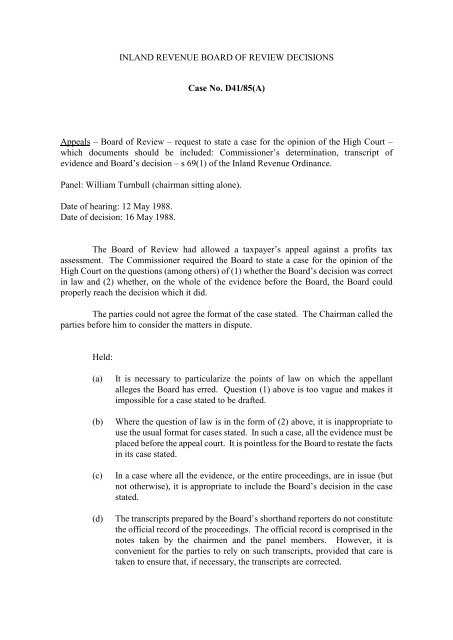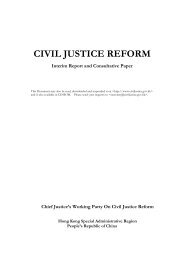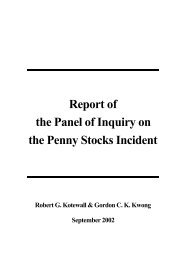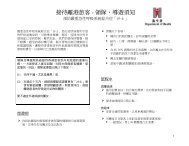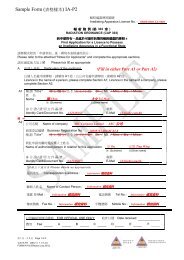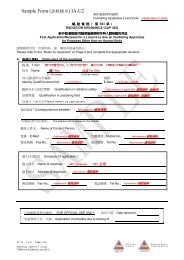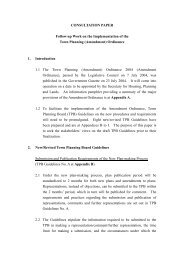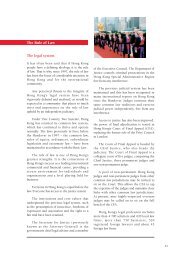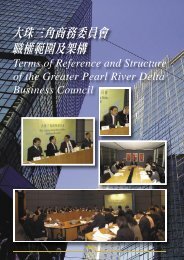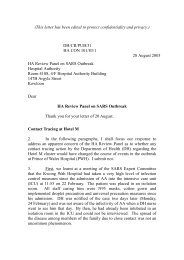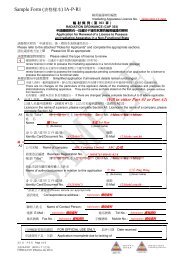INLAND REVENUE BOARD OF REVIEW DECISIONS Case No. D41 ...
INLAND REVENUE BOARD OF REVIEW DECISIONS Case No. D41 ...
INLAND REVENUE BOARD OF REVIEW DECISIONS Case No. D41 ...
You also want an ePaper? Increase the reach of your titles
YUMPU automatically turns print PDFs into web optimized ePapers that Google loves.
<strong>INLAND</strong> <strong>REVENUE</strong> <strong>BOARD</strong> <strong>OF</strong> <strong>REVIEW</strong> <strong>DECISIONS</strong><br />
<strong>Case</strong> <strong>No</strong>. <strong>D41</strong>/85(A)<br />
Appeals – Board of Review – request to state a case for the opinion of the High Court –<br />
which documents should be included: Commissioner’s determination, transcript of<br />
evidence and Board’s decision – s 69(1) of the Inland Revenue Ordinance.<br />
Panel: William Turnbull (chairman sitting alone).<br />
Date of hearing: 12 May 1988.<br />
Date of decision: 16 May 1988.<br />
The Board of Review had allowed a taxpayer’s appeal against a profits tax<br />
assessment. The Commissioner required the Board to state a case for the opinion of the<br />
High Court on the questions (among others) of (1) whether the Board’s decision was correct<br />
in law and (2) whether, on the whole of the evidence before the Board, the Board could<br />
properly reach the decision which it did.<br />
The parties could not agree the format of the case stated. The Chairman called the<br />
parties before him to consider the matters in dispute.<br />
Held:<br />
(a)<br />
(b)<br />
(c)<br />
(d)<br />
It is necessary to particularize the points of law on which the appellant<br />
alleges the Board has erred. Question (1) above is too vague and makes it<br />
impossible for a case stated to be drafted.<br />
Where the question of law is in the form of (2) above, it is inappropriate to<br />
use the usual format for cases stated. In such a case, all the evidence must be<br />
placed before the appeal court. It is pointless for the Board to restate the facts<br />
in its case stated.<br />
In a case where all the evidence, or the entire proceedings, are in issue (but<br />
not otherwise), it is appropriate to include the Board’s decision in the case<br />
stated.<br />
The transcripts prepared by the Board’s shorthand reporters do not constitute<br />
the official record of the proceedings. The official record is comprised in the<br />
notes taken by the chairmen and the panel members. However, it is<br />
convenient for the parties to rely on such transcripts, provided that care is<br />
taken to ensure that, if necessary, the transcripts are corrected.
<strong>INLAND</strong> <strong>REVENUE</strong> <strong>BOARD</strong> <strong>OF</strong> <strong>REVIEW</strong> <strong>DECISIONS</strong><br />
(e)<br />
(f)<br />
(g)<br />
It is generally improper to include the whole of the transcript in the case<br />
stated. Only that part of the transcript which relates to the giving of evidence<br />
is relevant.<br />
Where the Commissioner’s determination forms part of the evidence before<br />
the Board, it is proper to include the determination in the case stated.<br />
It is an abuse of the appeal provisions merely to seek a de novo hearing of the<br />
case before a judge on appeal. However, except in obvious cases, the Board<br />
will not interfere with such appeals but will leave the matter to be ruled upon<br />
by the High Court.<br />
<strong>Case</strong> referred to:<br />
[Editor’s note: This decision should be read together with D30/87(A) (this<br />
supplement). There, a different panel held that a question similar to (2) above was<br />
so vague that it did not raise a question of law at all. Accordingly, that panel<br />
refused to state a case.]<br />
Chinachem Investment Co Ltd v CIR CA, Civ App <strong>No</strong> 116 of 1987.<br />
P F Feenstra for the Commissioner of Inland Revenue.<br />
Robert G Kotewall instructed by Johnson Stokes & Master for the taxpayer.<br />
Decision:<br />
Following an application for a case stated the parties were unable to reach<br />
agreement as to the content of the case stated and the Chairman of the Board of Review who<br />
was also the Chairman of the Board which heard the appeal requested the parties to appear<br />
before him so that representations could be made and agreement reached or rulings made as<br />
to the content of the case stated.<br />
Mr Robert Kotewall for the Taxpayer and Mr P F Feenstra for the<br />
Commissioner appeared before the Chairman and made representations. The proceedings<br />
were conducted on an informal basis and the form of the case stated to be issued by the<br />
Board was agreed between the Chairman and the two Counsel.<br />
The Chairman informed the Counsel that he proposed to publish the rulings<br />
made and reasons therefore because similar problems were being encountered with regard to<br />
the content and form of other cases stated and this was agreed by both Counsel.<br />
The facts of this case stated are as follows:
<strong>INLAND</strong> <strong>REVENUE</strong> <strong>BOARD</strong> <strong>OF</strong> <strong>REVIEW</strong> <strong>DECISIONS</strong><br />
(a)<br />
The application for the case stated was in the following terms:<br />
‘ In accordance with section 69 of the Inland Revenue Ordinance the<br />
Commissioner of Inland Revenue hereby makes an application requiring the<br />
Board of Review to state a case for the opinion of the High Court on the<br />
following questions of law:<br />
1. Whether the decision of the Board of Review was correct in law.<br />
2. Whether on the whole of the evidence before the Board of Review it<br />
could properly determine that it was the intention of the Taxpayer to<br />
acquire and hold the shares as a long term investment and that it was not<br />
engaged in trade or in an adventure in the nature of trade.<br />
3. Whether the Board of Review was correct in not taking into<br />
consideration or finding the fact that it was always the intention of the<br />
Taxpayer to sell the shares.<br />
4. Whether the Board of Review was correct in determining that it was<br />
relevant that the shares were held for 4 years or that the shareholding was<br />
segregated in the Group accounts.<br />
5. Whether the Board of Review was correct in determining that the<br />
transaction was a Hong Kong transaction on the one hand and at the same<br />
time that the banking aspect of the transaction should be ignored.<br />
6. Whether there was any evidence of the basis of which the Board of<br />
Review could find that it was the intention of the Taxpayer to acquire and<br />
hold the shares as a long term investment.<br />
7. Was the Board wrong in law in failing to apply the provision of section<br />
68(4) of the Inland Revenue Ordinance (Cap 112) which provides that<br />
the onus of proving that the assessment appealed against is incorrect shall<br />
be on the Taxpayer.<br />
A fee of $400 accompanies the application.<br />
I shall be grateful if, in the first instance, the Board will provide me with an<br />
unsigned copy of the case stated in order that it may be forwarded to Crown<br />
Counsel for advice.<br />
I shall also be grateful if the Board will provide a copy of the transcript of the<br />
proceedings before it.’
<strong>INLAND</strong> <strong>REVENUE</strong> <strong>BOARD</strong> <strong>OF</strong> <strong>REVIEW</strong> <strong>DECISIONS</strong><br />
(b) A draft case stated was prepared by the Chairman and submitted to the parties<br />
for comment and agreement. The format and content used was based on that used in the<br />
Chinachem case.<br />
(c) Neither party was in agreement with the format or content of the draft case<br />
stated. Counsel for the Taxpayer produced a new and different draft which was rejected by<br />
Counsel for the Commissioner who then prepared a new and again different draft. Counsel<br />
met and were in correspondence for some considerable length of time in an endeavour to<br />
reach agreement and ultimately were able to do so in a format similar to that originally<br />
proposed by the Chairman of the Board (that is, the Chinachem format) but certain matters<br />
could not be agreed.<br />
(d) Counsel for the parties were unable to resolve: (i) whether or not the transcript<br />
of the proceedings in whole or in part should be incorporated into the case stated; (ii) to what<br />
extent the Board of Review should make separate or additional findings of fact; (iii) whether<br />
statements as to the credibility of the witnesses should be included; (iv) whether the<br />
acceptance by the Board of Review of the documentary evidence before it should be<br />
repeated; (v) whether the Commissioner’s determination should form part of the case stated;<br />
and (vi) whether the application for the case stated should be included.<br />
(e) It was agreed by both Counsel that: (i) it was not appropriate for separate<br />
findings of fact to be prepared; (ii) that the decision of the Board should form part of the case<br />
stated; and (iii) that the facts found should be in the form of the decision of the Board.<br />
(f) It was further agreed by Counsel and confirmed by the Chairman that the Board<br />
of Review had accepted the evidence before it in toto by incorporating into the decision the<br />
following statement:<br />
‘ The facts of the case stated are found in the determination of the Commissioner,<br />
in evidence given before the Board of Review by Mr A, in two Affidavits one<br />
by Mr B and the other by Mr C and in certain Exhibits produced by the witness<br />
who appeared before the Board of Review.’<br />
(g) Section 69 of the Inland Revenue Ordinance provides that the decision of the<br />
Board of Review shall be final save and except for appeal by way of case stated on a<br />
question of law. It has been held that the case stated procedure is a useful and effective<br />
method of applying to the High Court for legal rulings on precise questions of law but it is<br />
not a practical way to rehear a case on appeal.<br />
(h) When making application for a case stated under section 69, it is necessary to<br />
particularize the question of law on which the opinion of the High Court is required. The<br />
question ‘whether the decision was correct in law’ is insufficiently precise because it does<br />
not state the point of law in issue and makes it impossible for a case stated to be drafted. It is<br />
necessary to particularize the point or points of law on which it is alleged the Board has<br />
erred.
<strong>INLAND</strong> <strong>REVENUE</strong> <strong>BOARD</strong> <strong>OF</strong> <strong>REVIEW</strong> <strong>DECISIONS</strong><br />
(i) <strong>Case</strong>s stated can be divided into two types, the classic and the factual. The<br />
classic type requests a decision on a precise question which does not involve the entire<br />
proceedings or the entire evidence before the Board and it is appropriate to extract from the<br />
decision and/or evidence those facts which are relevant to enable the judge on appeal to hear<br />
the case and make his decision. This is the classic form of case stated and is the most<br />
appropriate type of case stated procedure. It is the one covered by the precedents and which<br />
the courts have had in mind.<br />
(j) Where the question is whether on the whole of the evidence before it the Board<br />
could properly determine something which it did, it is difficult or impossible for the Board<br />
to state a case in the classic form.<br />
(k) There is a substantial distinction between the classic case and the factual case<br />
and this distinction has been highlighted by the present case and the problems which<br />
Counsel have encountered in trying to reach agreement on the form and content of the case<br />
stated. It is necessary for all of the evidence to be placed before the judge on appeal because<br />
he is being asked to decide whether ‘on the whole of the evidence’ the Board could have<br />
reached the decision which it did. It is pointless and possibly misleading for the Board to<br />
restate the facts, find additional facts which do not feature in their decision, or otherwise edit<br />
or represent their original decision.<br />
(l) At proceedings of the Board of Review, shorthand stenographers are present<br />
who keep a verbatim note of the entire proceedings. In addition the proceedings are tape<br />
recorded. There is available a verbatim transcript of the entire proceedings. However, this<br />
transcript is not the official ‘record’ of the proceedings which is the record kept by the<br />
Chairman and members of the Board hearing the case. However, subject to the skill of the<br />
stenographers and the limitations of microphones picking up what may be said in an audible<br />
form, the transcript of the proceedings must be the best evidence of what was actually said at<br />
the hearing. It has accordingly been customary for Counsel to request a copy of the<br />
transcript rather than to request a copy of the record of proceedings. This is convenient to<br />
the Board because it avoids the necessity of the Board having to take the time to prepare the<br />
record which would be an edited note of the proceedings, including in abbreviated form the<br />
questions and answers given in evidence, but it would not be verbatim. The length of time<br />
which would be necessary to prepare such a record is considerable bearing in mind the<br />
complexity of the Board of Review cases. Furthermore, it would be a futile exercise for the<br />
Board to prepare such a record of the entire proceedings when only certain points are likely<br />
to be in issue on appeal.<br />
(m) The transcript of the proceedings when delivered to the parties is the unedited<br />
version produced by the stenographers within the limits of their individual abilities. Bearing<br />
in mind that the proceedings are also tape recorded, that the parties have an obligation under<br />
court rules to maintain notes of the proceedings and that the Chairman and members of the<br />
Board also keep their own notes, there would appear to be no reason why any inaccuracies in<br />
any relevant parts of the transcript prepared by the stenographers cannot be corrected. There
<strong>INLAND</strong> <strong>REVENUE</strong> <strong>BOARD</strong> <strong>OF</strong> <strong>REVIEW</strong> <strong>DECISIONS</strong><br />
can be no excuse, as apparently occurred in the Chinachem case, for one of the parties to an<br />
appeal filing an inaccurate transcript before a judge on appeal.<br />
(n) In the present application for a case stated, one party has requested that the<br />
entire transcript be made part of the case stated. This is considered to be unnecessary and<br />
incorrect. The entire transcript cannot form part of the case stated but that part of the<br />
transcript which relates to the giving of evidence is relevant and should be incorporated. It<br />
is part of the evidence on which the Board reached its decision.<br />
(o) It is appropriate in this case for the Commissioner’s determination to be<br />
included in the case stated because it also formed part of the evidence before the Board. As<br />
the onus of proof in a Board of Review appeal is upon the taxpayer to show that the<br />
Commissioner’s determination was wrong, it may well be that a copy of the determination<br />
should be included in most cases stated which relate to factual matters.<br />
(p) A distinction must be drawn between facts found by the Board and evidence<br />
before the Board. The volume of evidence may be vast but the facts may be very short.<br />
Much evidence may not be material or may be of general importance to enable the Board to<br />
reach a decision on a particular fact or on the credibility of a witness. There may be long<br />
inconsequential cross-examination. This may be relevant to the case stated in some<br />
instances, for example ground of appeal number 3 in the present application for a case<br />
stated.<br />
(q) In the present appeal, submissions were made as to whether or not the decision<br />
of the Board should form part of the case stated. In a classic form of case stated it would not<br />
be appropriate to include the entire decision but, where the case stated is putting in issue the<br />
entire proceedings, or all of the evidence or the logic of the entire Board’s decision is in<br />
question, it would appear to be appropriate to include the entire decision as part of the case<br />
stated.<br />
(r) Attention is drawn to the fact that section 69 of the Inland Revenue Ordinance<br />
and the case stated procedure is limited in its scope to questions of law and does not permit<br />
a rehearing of the case on appeal. Attention is drawn to the fact that an application for<br />
judicial review and not a case stated may well be the appropriate procedure in some cases.<br />
However, the Chairman of the Board of Review is anxious to assist parties to take points of<br />
law on appeal before judges of the High Court so that definitive rulings on the law can be<br />
obtained and does not wish to appear to prejudice matters or in any way to impede the<br />
parties. It must however be understood that there has been frequent criticism of the Board of<br />
Review by judges on appeal with regard to the content or form of a case stated. Careful<br />
analysis of such cases may reveal that the case stated procedure was inappropriate and that<br />
the parties have used the procedure as an abuse of section 69. A case stated is not an<br />
appropriate procedure for a de novo hearing of the case before a judge on appeal, and it is<br />
hoped that a judge on appeal will so rule in appropriate cases. The Chairman does not wish<br />
and considers it improper that the Board of Review should intervene in this regard other than<br />
when the application for a case stated is clearly outside the scope of section 69.


